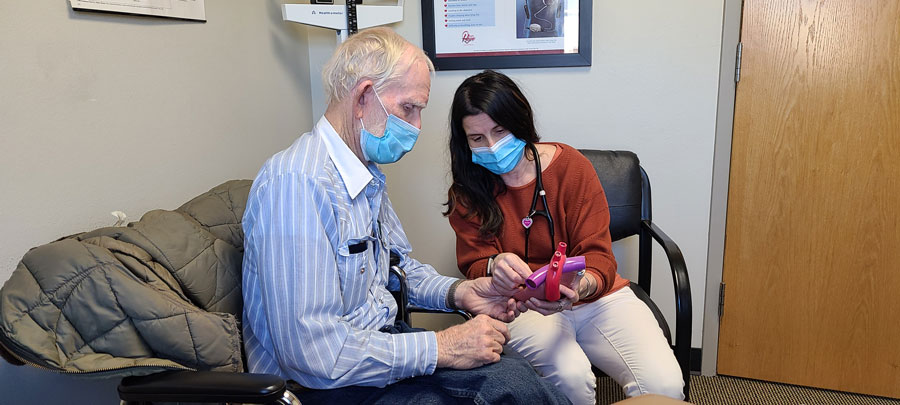What getting COVID-19 is like — from a doctor’s perspective
Published at | Updated at
So, I got COVID-19.
Despite my best efforts to keep my family, friends, my patients and myself safe, I still ended up with the illness that has turned the world upside down.
I suppose it wasn’t too much of a surprise. I am a doctor, and as a medical professional I know how viruses work. I know how to sort through all the information to determine what we know, what we don’t know, and what does or doesn’t makes sense about COVID-19.
I generally avoid the hype, and the minute-by-minute updates on the news. If I read all there is to read about this, I might go stone cold from terror. Instead, I’ve just tried to do the best I could to be knowledgeable about the virus, and to be wise about how to avoid catching it.
But in the end I still got COVID-19, and that’s a very real possibility for everyone. I’m not 100 percent sure where I got it, but it wasn’t from treating patient or at any of the hospitals. With all the protocols, hospitals appear to be among the safest places.
While I was in quarantine I decided to write about my experience with the virus, hopefully to give people a perspective about what a moderate case of COVID-19 looks like. I know there are people with much more severe symptoms than I have experienced, and there are others with milder symptoms.
I know people who got mildly sick, and used the quarantine as an opportunity to go camping. Others had to be hospitalized and I know a few who have died. I don’t really have a full understanding about why COVID seems to pick people at random. I can speculate and make educated guesses, but that is all.
As doctors I think we are starting to understand the predictors of this prognosis, but it’s going to be years before we understand it all.
It’s that uncertainty that is most scary. As I sat in my room recovering, I didn’t know if I was going to get worse, and I didn’t know if this was something that would kill me. I tried to convince myself that I was improving, but that wasn’t how I felt.
My symptoms were severe fatigue (beyond any all-night call shift at the hospital), and I had severe myalgia (muscle pain). I needed narcotics just to be able to take a deep breath. Interestingly, I never did have a fever or that famous deep cough.
I was lucky enough to be able to isolate from my family inside my own home. My loving husband was brave enough to don a mask and gloves to check up on me. The virus scared him, and it scared my teenage children. I tried to reassure them as much as I tried to reassure myself.
I also tried to understand how my illness impacted them. My children were quarantined because of me. They told me they understood but I saw the worry in their eyes when I talked to them through Facetime inside our own house. My husband was forced out of the bedroom to sleep on the couch or a blow-up mattress in the living room. He still cooked for me, but could only bring my dinner to be left outside my door. I’m grateful I maintained my sense of taste and smell through this.
Sometimes I would hear them out in the kitchen talking, laughing, or arguing about the day, and I’d feel sorry for myself. I knew they were there for me and were happy to get me anything – I just needed to pick up the phone and call. But I still felt somewhat excluded.
At one point, I asked my family if I could come out of my room in a N-95 mask and gloves to go play the piano for a little bit. They agreed but then stood back in horror as if I was a zombie and going to eat their brains. I understand though. They aren’t used to being close to sick patients.
Another oddity about the virus is how people outside your family treat you. There are people that treated me like I have the plague, or worse there are some who treated me like I was being overdramatic. Thankfully, there was and still is an overwhelming feeling of love from many people. The gift basket from a colleague who thought I had passed was nice but fortunately a bit premature, but I am thankful for the concern felt by my friends and family.
I am happy to say that after several weeks of illness and quarantine, I am recovering and am back to working with patients.
I learned a lot from the illness — to be brave, patient and to trust in those that love you. During my quarantine my family felt both near and far, but it was so reassuring to know they were there.
I was fortunate that my case was moderate, because there are others who become much more sick, and aren’t able to weather the illness as well as I have. COVID-19 is a very different experience for everyone, and this illness has reemphasized the importance of not judging someone who catches the virus.
My heart goes out to those who have suffered and who have lost loved ones. This is a worldwide issue and it touches all of us. But we are in this together, and I have so much more empathy for the people going through this, or dealing with family or friends who are.
I’m also very grateful for all the family, friends and colleagues for loving me through this trial.
Dr. Blake Wachter is a cardiologist at the Idaho Heart Institute in Idaho Falls.


